Google's head of Android development Sundar Pichai made brief remarks at Google IO to address the enterprise, a market that so far has largely ignored Android while enthusiastically adopting Apple's iOS mobile platform. Notably, his solution involved a "contribution" of Knox security by Samsung, Android's largest licensee.
Google hopes to be taken seriously by business with its upcoming "L" release (perhaps "Lollypop") of Android 5.0, slated for release later this year. Pichai in particular directed attention at new efforts targeting data separation and security and the bulk deployment of apps, two of Android's largest weaknesses in the business market.
Samsung "contributes" Knox to Android
Pichai specifically noted that the future Android 5.0's security layer involves Samsung's "contribution" of Knox, a feature that company unveiled last spring as part of its "SAFE" (Samsung for Enterprise) initiative.
Knox principally erects a "container" or sandbox around corporate apps and data to prevent any unauthorized mingling with a users' private, unsecured email, apps and other personal data.
According to a report by The Information, Google and Samsung faced a tense standoff in January regarding Samsung's demonstration of a new user interface dubbed "Magazine UX," which Pichai determined to be a direct threat to Google's control over and monetization of Android.
Pichai was reportedly "prepared to forbid" Samsung from using the ostensibly open Android operating system unless it fell into line with Google's requirements. That demand makes more sense given Google's latest announcement of a second attempt at delivering its own cohesive user interface for Android, an web-inspired initiative it calls "Material Design."
But the standoff also explains how Samsung could be strong-armed into "contributing" Knox, a significantly differentiating feature that has made some of Samsung's products at least possible for government and corporate users to buy, while other Android vendors have been virtually shut out of the enterprise entirely, as alluded to by IDC's Mobility Research Director Ryan Reith.
Knox was a differentaitor for Samsung in enterprise...'was' being key word. Why would they let that go??
— Ryan Reith (@ryanreith) June 25, 2014Samsung's Knox fails to pop Android sales to shops
After announcing Knox last spring, Samsung immediately began marketing its Galaxy S III and Note II as "SAFE for business" via billboards portraying Samsung devices running mockups of business presentation and project management software that doesn't really exist
Samsung also began offering trade-in rebates for companies willing to purchase hundreds of Galaxy devices, suggesting that companies could "save" tens of thousands of dollars trading in their fleets of higher end iPhones for rebates of no more than $300 each while paying full price for new mobile devices in order to become Samsung customers. That strategy didn't work very successfully.
A year later, Samsung hasn't made a dent in Apple's overwhelming dominance in the enterprise. Last spring, Apple's iOS made up 75 percent of all mobile device activations by Good Technology, and this year the Q1 figure remained at 72 percent.
Among business tablets, there's even less competition. Apple's iPad made up 92 percent of Good's enterprise activations, resulting in an overwhelming number of custom corporate apps— 93%— targeting iOS. Once invested in iOS, business users are even less likely to evaluate incompatible alternatives.
In May, Samsung executive Dr. Injong Rhee acknowledged to the Wall Street Journal that while the company has delivered 87 million devices embedded with Knox, only 1.8 million of those are actively using Knox.
The paper noted that the executive "declined to comment on how many paid customers the company has won so far with its Knox system."
Google's "race to make Android work for businesses"
A second report by Amir Efrati for the The Information detailed Google's strategy and difficulties in winning over business users from iOS, the day before Pichai unveiled Google's plans to adopt Samsung's Knox.
Efrati profiled Needham Bank's chief technology officer James Gordon, who manages devices for the organization's 180 employees. Gordon described efforts to deploy an investment officer's Samsung Android phone as a "kludgy" process, noting that his team "'doesn't want to support Android' because 'there's a lot of complexity' in configuring the devices."
Gordon was cited as saying "we've been growing up with Apple devices, and it still comes down to user experience," noting that his bank 'trusts Apple more' and would be more likely to recommend Windows Phone than Android given that his employees use Microsoft Office.
The report also cited Craig Johnston of IT consulting firm NTT Data, who outlined all of the Mobile Device Management options supported by iOS that are not addressed by Android, with or without Knox, and Windows Phone 8 (sample below).
Johnston noted that Android is "really suffering" and is seriously behind in supporting the mass deployment tools and options Apple most recently addressed in February. Apple began working to make iPhones relevant to companies back in 2008, and has made corporate support a primary focus in every subsequent release of iOS.
"iOS is very established so it will take time" for Android to make any progress Johnston was cited as saying.
Roman Foeckl, the chief executive of global security vendor CoSoSys noted to AppleIsnider that "todays announcement at Google I/O to add more security and granular controls to Android is good news for Enterprise admins that are facing the challenges of BYOD.
"Google is bringing more power to Android on the OS layer for dual-persona features that allow for a clear separation of personal and business data on one device. This is what will continue driving adoption of Android devices in the enterprise as this is an essential feature for enterprises that have this requirement to be compliant with different regulatory requirements and industry standards."
Foeckl added, "Google is adding more features for Mobile Device Management to Android as Apple has done for years in iOS. As device vendors like Samsung have adopted their Android distributions with features such as Knox it was about time that Google follows this device vendor requirement that is driven by business and enterprise customer demand.
"Apple has for years empowered enterprise IT with full management capabilities in iOS that developers for Android MDM solutions had to replicate or find workarounds that never gave that powerful of a feature set of APIs as iOS had since early versions of iOS. Growing large scale deployment in Enterprises and Education are forcing Google to follow Apple's iOS."
Google's next leg of the enterprise race involves distributing its new software
The Information also called attention to Google's parallel issue of not having most of its Android user base running on the latest version, nor even able to upgrade in many cases.
Google has focused on delivering updates via "Google Play Services," a metric Pichai called attention to in his presentation today. However, for enterprise users who demand security, Google Play updates aren't enough to patch up a fragmented array of phone hardware running a broad swath of different API versions of Android, many of which contain serious underlying security vulnerabilities.
In February, Pichai blew off a question about Google's security with a response stating, "we do not guarantee that Android is designed to be safe; its format was designed to give more freedom. When they talk about 90% of malicious programs for Android, they must of course take into account the fact that it is the most used operating system in the world. If I had a company dedicated to malware, I would also send my attacks to Android."
One month prior to that, Cisco issued a report targeting enterprise users noting that 99 percent of mobile malware targets Android, harmonizing with comments by Juniper Networks in a report last summer that noted that "77 percent of Android's threats could be largely eliminated today if all Android devices had the latest OS. Currently only 4 percent do."
Apple's Tim Cook called particular attention to the rapid adoption of iOS 7 by users, noting earlier this month at WWDC that 89 percent of the company's mobile users are actively using iOS 7. Google's latest figures indicate that only 13.9 percent of Android users who actively access Google Play (a figure that excludes most Android users in China or users of forks like Amazon's Fire lineup) are running a version as new as iOS 7.
The largest block (29 percent) of Google's own active Android users are still on Android 4.1, released in the summer of 2012 alongside iOS 6. Another 28 percent are on an even older version of Android dating back as far as 2010 when Apple released iOS 4.
 Daniel Eran Dilger
Daniel Eran Dilger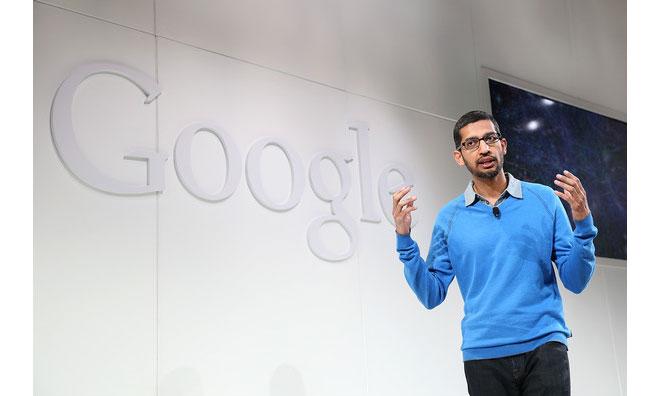
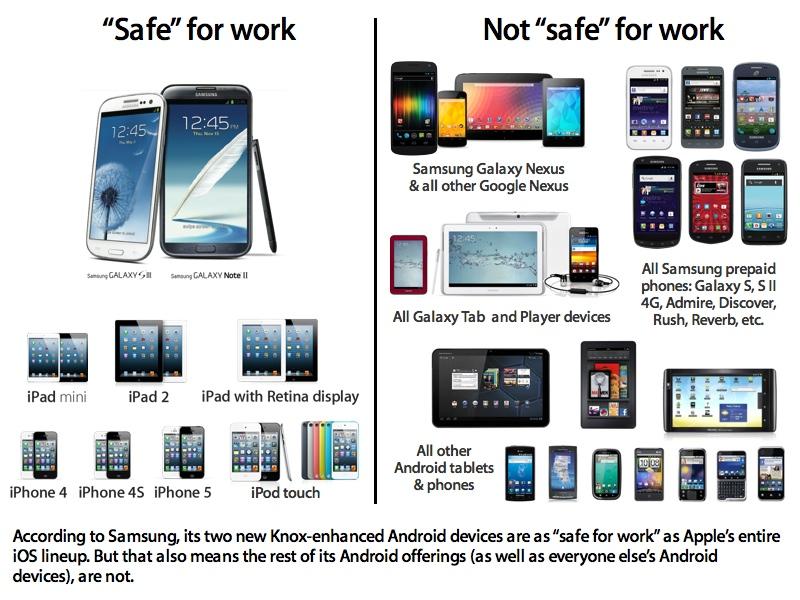
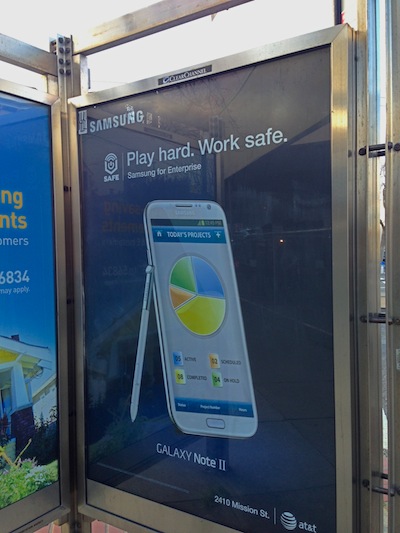
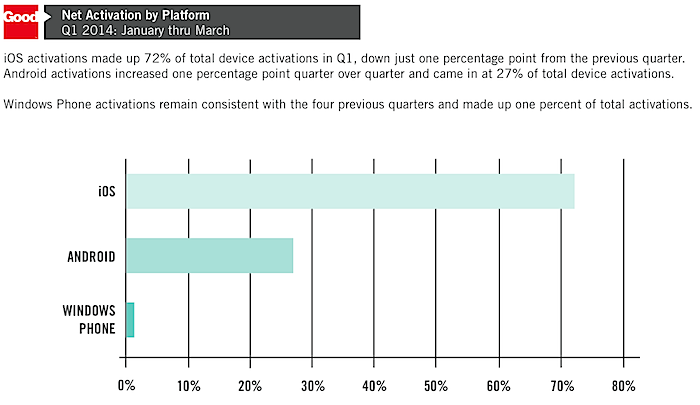
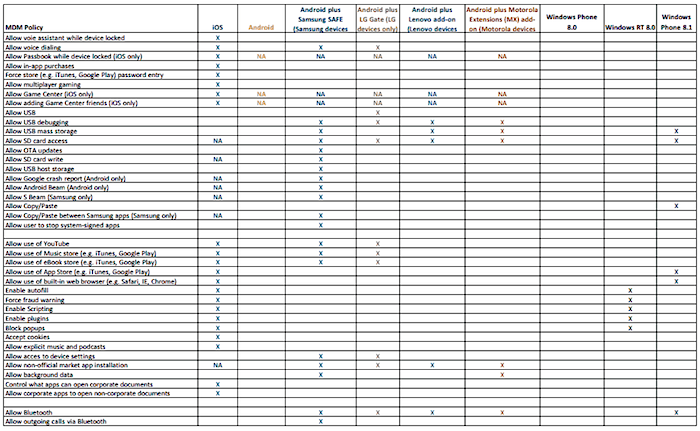
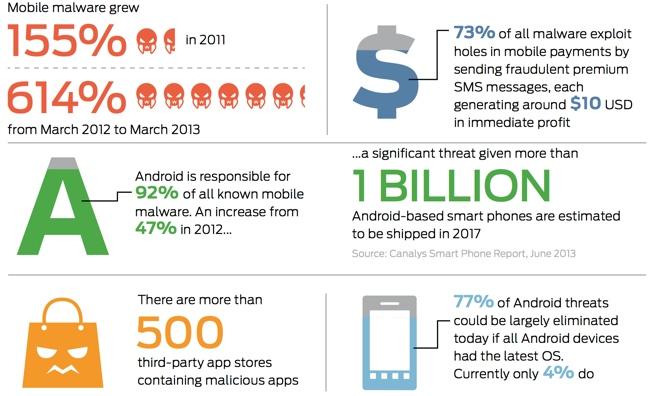




-m.jpg)


-m.jpg)






 William Gallagher
William Gallagher
 Malcolm Owen
Malcolm Owen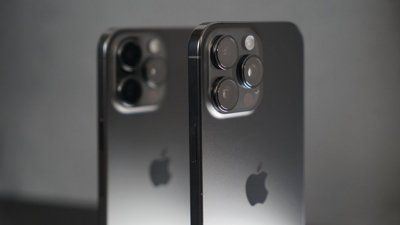

 Christine McKee
Christine McKee
 Chip Loder
Chip Loder
 Oliver Haslam
Oliver Haslam
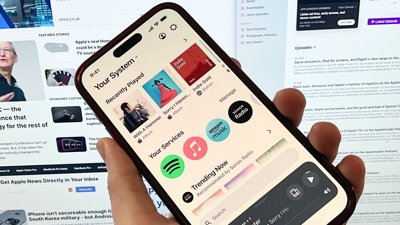

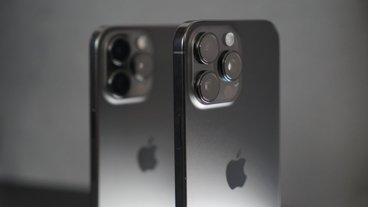







44 Comments
I do not think many Corporate 1000 companies trust Google at the enterprise service level. This may change, but its hard to see an abandonment of the 'tried & true' for the 'new & untested'. I am not saying that it cannot be done, but it will require an entire new dedicated division within Google to do this and even then ,there's no assurance it will succeed.
Considering Knox is a failure (I will find the link on Patently Apple), Pinchai's promotion of Knox shows how desperate Google is to have ANY kind of story to compete with Apple! I am starting to hope the 4.7 and 5.5 iPhone rumors are true because Apple would be in a very strong position to demolish Android in North America and China starting the day the iPhones were released for sale!
Considering Knox is a failure (I will find the link on Patently Apple), Pinchai's promotion of Knox shows how desperate Google is to have ANY kind of story to compete with Apple!
I am starting to hope the 4.7 and 5.5 iPhone rumors are true because Apple would be in a very strong position to demolish Android in North America and China starting the day the iPhones were released for sale!
What can android device have left after iPhone 4.7" and 5.5" release? Damn, I can't think of any...or maybe Android Earings?
Who in their right mind would trust Guugle...with anything important?!
KNOX started off with so much promise as it actually looked very good. But it only worked on certain Samsung devices that had the necessary hardware to support it. Then there's all the little "issues" that popped up. As it stands, only a very small percentage of Samsung devices that have KNOX actually have it enabled.
I guess Google lacked the resources to bring Enterprise security to Android, so they made a deal with Samsung to take KNOX and apply it to Android. The really tough part is going to make it work across various manufacturers.
As mentioned, Samsung devices need certain hardware to run KNOX. That's why early versions of the GS3 wouldn't support it. How many OEM's are going to want to make hardware changes to ensure they can properly run KNOX? Further, to run KNOX means to have your device locked down tight as a drum. No more custom ROM's. I wonder how the Android community will respond to this? Are people going to flock to non-KNOX devices to maintain their "freedom"? This will really give us a good idea of how many people actually care about ROMs and how many just yap about it but never do it.